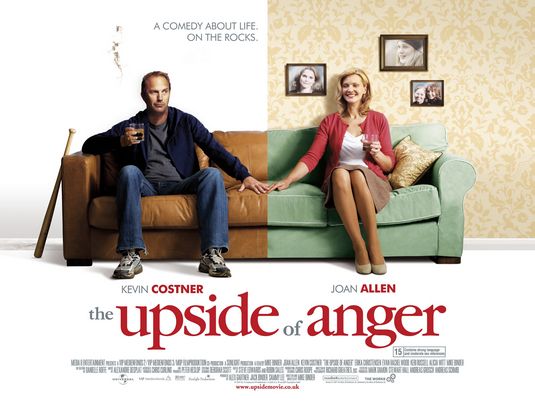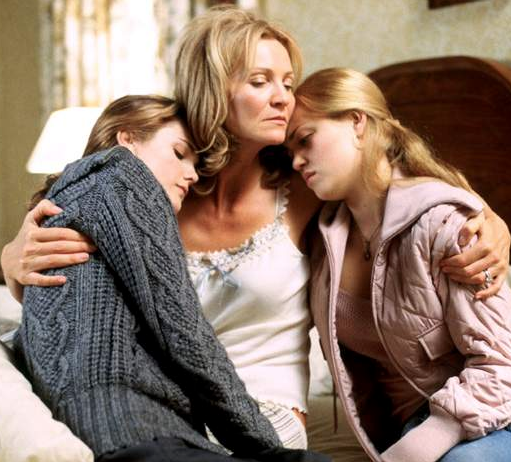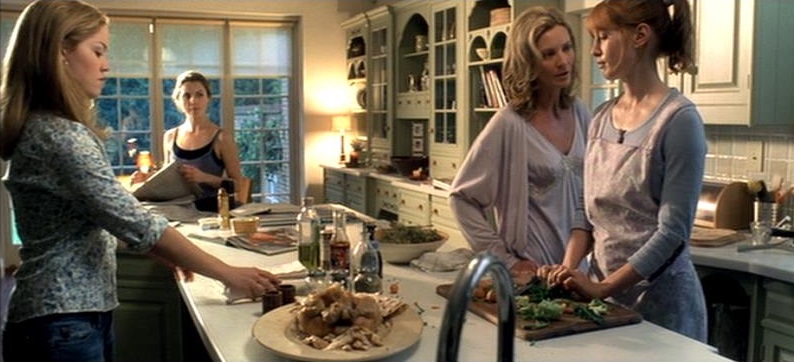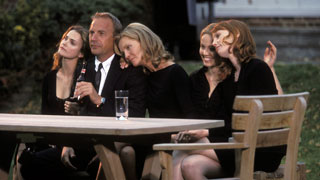a special anniversary tribute from Adam Armstrong

Are you close with your father?”
This was asked of me recently at a social gathering for a graduate school program I may attend in the fall. Not knowing how to respond, or rather, unwilling to respond honestly, I answered by saying, “Yes, you could say so.”
This is the scenario people who come from a family in which the dynamic has been disrupted from a parent abandoning the unit loathe, yet know all too well its inevitability in conversation.
 So does The Upside of Anger, which is celebrating its tenth year in release. The film chronicles the means by which a family copes and moves forward with their lives after the patriarch has left them, presumptuously thought to have run off with his younger secretary to live in Sweden. The family, one all too relatable in this modern familial climate of increasing divorce rates, is comprised of a bitter mother and her brood of children, all of whom in some way fail to meet her and each other’s expectations. [more...]
So does The Upside of Anger, which is celebrating its tenth year in release. The film chronicles the means by which a family copes and moves forward with their lives after the patriarch has left them, presumptuously thought to have run off with his younger secretary to live in Sweden. The family, one all too relatable in this modern familial climate of increasing divorce rates, is comprised of a bitter mother and her brood of children, all of whom in some way fail to meet her and each other’s expectations. [more...]
Since the father left, Terry Ann Wolfmeyer (Joan Allen) feels a certain duty to watch over her children and offer guidance, but often misdirects that love and care in the form of barbs of anger and resentment. The eldest daughter, Hadley (Alicia Witt), confesses on the day of her college graduation that not only is she engaged, but she’s also pregnant, information her fiancé’s parents have already been privy to for some time. The second eldest daughter, Emily (Keri Russell) wants to study dance at the collegiate level, which Terry finds unrealistic and impractical. Her third daughter, Andy (Erika Christensen) makes the decision to skip college and immediately enter the work force while simultaneously dating a much older man. The youngest daughter, Popeye (Evan Rachel Wood) observes all of this from sidelines, vocalizing the family’s dysfunction but is often dismissed due to her youth.

There’s no way to discuss the film without also praising Allen’s performance, which garnered such a deficient amount of accolades during that awards year. Apart from receiving a nomination from the BFCA and winning a couple regional critics prizes, this performance went otherwise unnoticed in the awards bodies, much to the chagrin of us cinema lovers and Allen fans. With this role, where Allen mustn’t bottle up her emotions or constantly worry about the preservation of her image and how she’s perceived as in The Crucible, but the exact opposite; she unleashes a furious, funny, and passionate performance that ranks among the very best of the Aughts.
The film is fearless in its dissection of the relationships we have with the people closest to us, the people who seemingly know us best. The film could have used the father’s absence as a direct cause to the Wolfmeyers’s inability to connect with one another, but instead uses the event as a catalyst to force the family members to confront the issues that have long been simmering beneath the surface. Take for example the fact that Hadley has been dating her fiancé for three years yet chooses only now to inform her mother of her relationship. Or that Andy, who foregoes college for a production assistant job, already made the decision months ago, and told her father yet not her mother. These are secrets that are common among families, whether the parents are still together or not. These are the sort of secrets that will continue to be whispered in the ears of everybody except the pair its being hidden from because that’s human nature, it’s what being a family is all about.

What the film does so well is the way it observes the characters without judgment. The need to understand is valued over the desire to expose. Nobody is shamed for his or her misbehavior. No apologies are given nor requested for when people do not act the way that others expect them to. The characters accept one another and move on despite the anger. The anger fuels their change to love one another. It may not be love as they used to know it, but it’s a love they must learn to understand.
I may still lack the capability to answer questions regarding the wellbeing of my father, or his whereabouts. But, much like the Wolfmeyers, I understand that I don’t have to understand why he did what he did; all I have to do is keep moving forward.

 Adam Armstrong hailed from the confines of a Christmas Tree Farm in upstate New York. Starting in the fall of 2015 he will be enrolled in the MFA in Creative Writing and Literature program at Stony Brook Southampton. When he’s not enjoying the pleasures of a life without pants, you can find him scribbling away on personal essays and short stories while also defending (against all odds) the credibility of Sienna Miller and Cersei Lannister. [Follow Adam on Twitter | Previous Posts by Adam]
Adam Armstrong hailed from the confines of a Christmas Tree Farm in upstate New York. Starting in the fall of 2015 he will be enrolled in the MFA in Creative Writing and Literature program at Stony Brook Southampton. When he’s not enjoying the pleasures of a life without pants, you can find him scribbling away on personal essays and short stories while also defending (against all odds) the credibility of Sienna Miller and Cersei Lannister. [Follow Adam on Twitter | Previous Posts by Adam]
More about The Film Experience team here